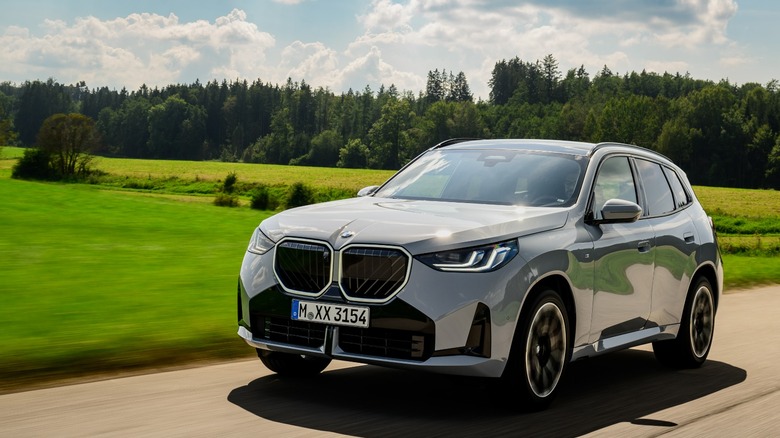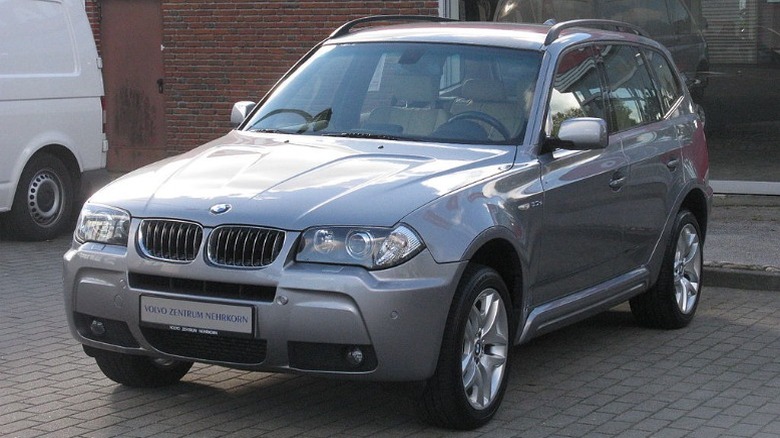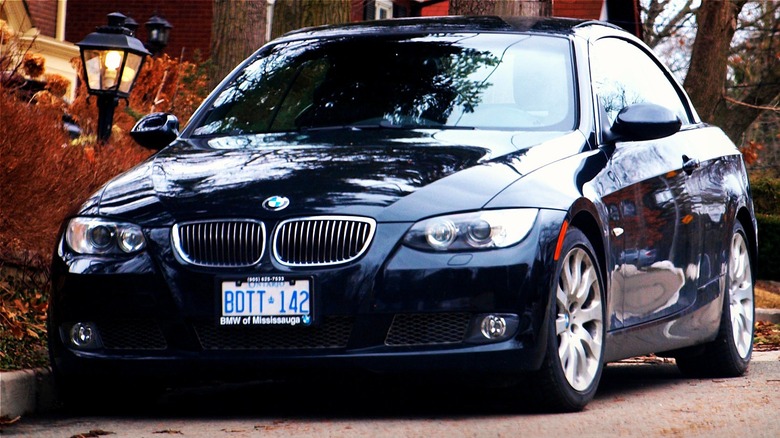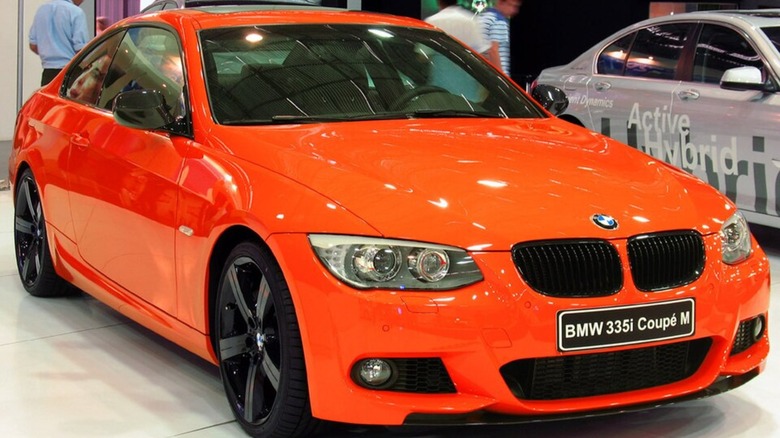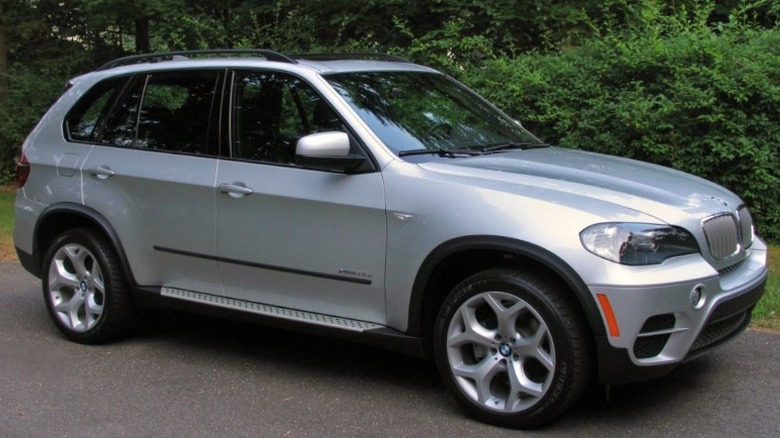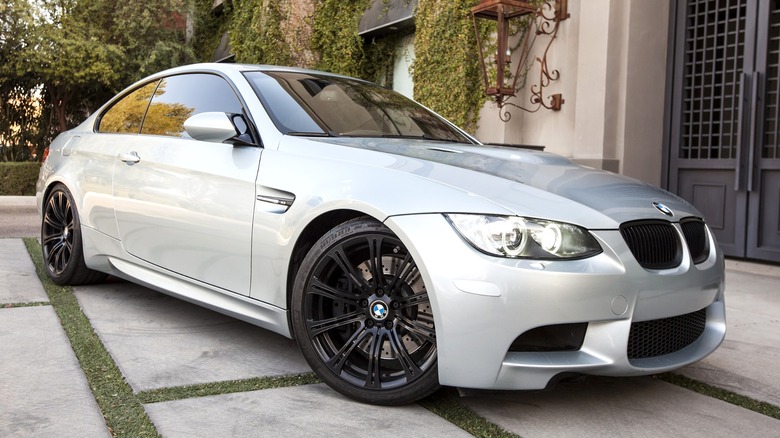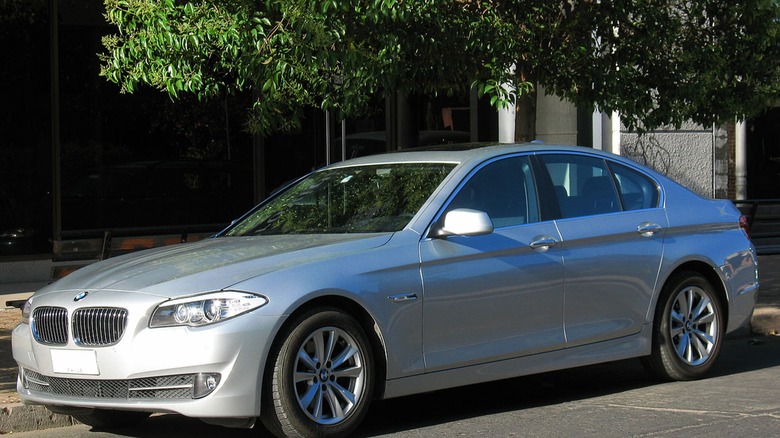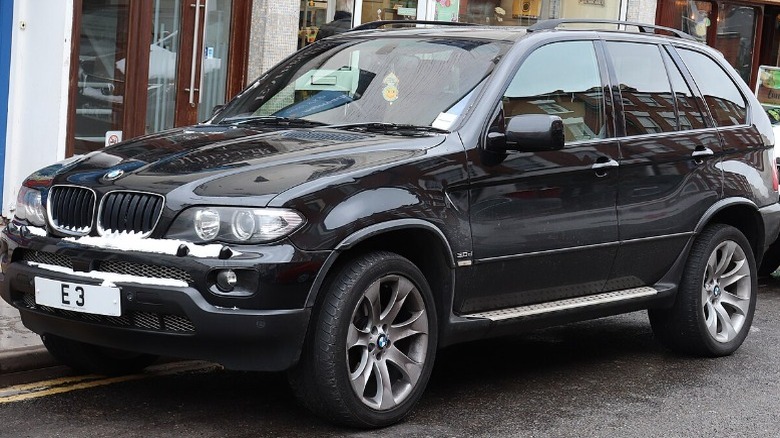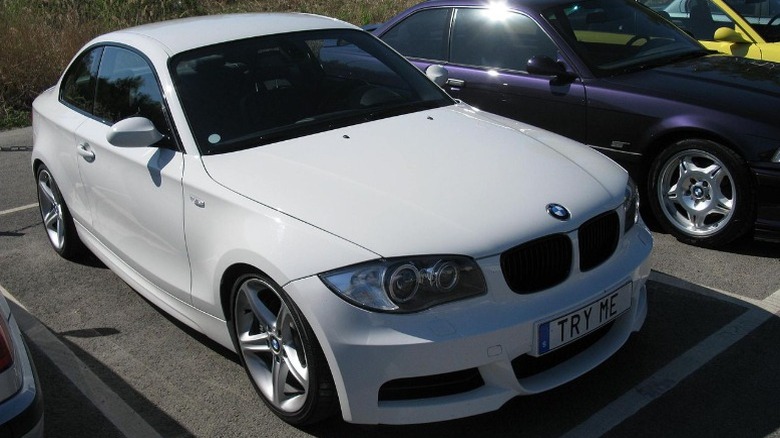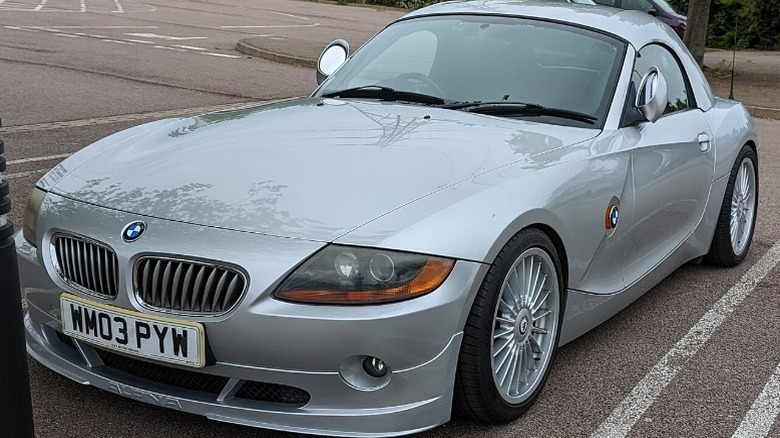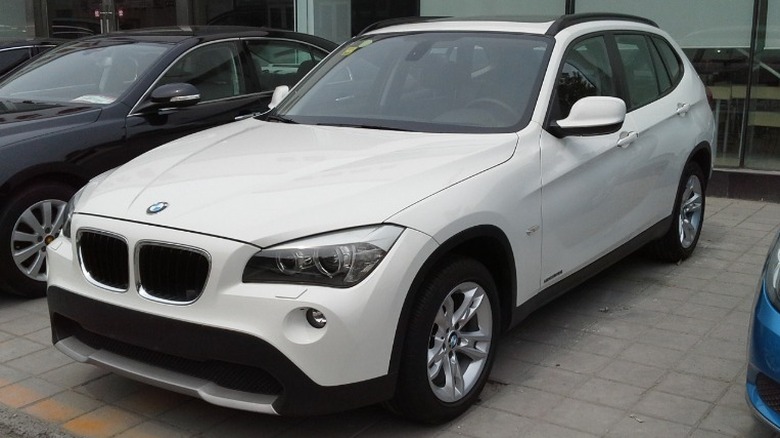10 Used BMW Models To Steer Clear Of At All Costs
Despite its established name and success, BMW isn't particularly popular in the used car market. Falling behind the likes of Toyota, Ford, and Chevrolet, the brand has proved better at sustaining a reputation for luxury and performance than reliability. Purchasing a used vehicle, however, isn't all about the brand name, even though that's a significant factor. Sometimes, it boils down to the model you're settling for.
Are BMWs reliable? Well, you'll find that more recent models are generally more dependable than their older counterparts. This explains why it was ranked 21st on JD Power's reliability rating in 2011 and climbed to the 9th position in 2024. So don't fret — if BMW is the brand that has caught your eye, you'll find some used models worth purchasing. But in the meantime, you should keep your eye out for some bad eggs that would have you draining your pockets in maintenance costs and repairs. That said, here are 10 used BMW models to steer clear of at all costs.
2013 BMW X3
There are some good things you should know about the new BMW X3, but unless you're trying to deal with a load of engine problems, you might want to avoid the 2013 BMW X3. This SUV might have initially drawn appeal as a sporty luxury crossover, but it has left many purchasers disappointed over time.
The X3's engine issues can mostly be traced to the timing chain, which tends to stretch or break, leading to engine damage. This problem was common for the many BMW vehicles equipped with N20 and N26 engines, and the long list of complaints eventually led to a lawsuit settlement in 2021. While not admitting any fault, BMW offered some compensation through reimbursement and repairs. However, this reimbursement was limited and dependent on the vehicle's mileage, meaning that those that exceeded 100,000 miles or that had been in service for more than 8 years were entirely excluded. No official recall was made, and owners have continued to complain about this problem years later.
Apart from these, the 2013 BMW X3 seems to have its fair share of powertrain and electrical system issues, and it has had seven recalls so far. So we recommend that you avoid it altogether.
2011 BMW 328i
Competing with vehicles such as the Audi A4 and Mercedes-Benz C-Class, the BMW 328i has established itself as a mainstay in the BMW lineup with its own dedicated customer base. However, the 2011 model has proven quite problematic, causing over 600 complaints and 11 recalls.
There are reports of airbag, engine, and powertrain problems. Another notable issue is vanos bolt failure. It was discovered that when this component breaks or comes loose, the engine may stall. This is because it holds the variable camshaft timing adjustment unit in place. In fact, this problem is common with many BMW models that were released between 2010 and 2012.
It was not until October of 2023 that a recall on the vanos bolt was made. However, months later, owners still raise concerns about the company's failure to adhere promptly to the recall, rendering some owners incapable of driving their cars.
2011 BMW 335i
Since the 335i belongs to the BMW Series 3, it shares similar problems to the BMW 328i. It has also been subject to 11 recalls, and while it has fewer NHTSA complaints than the 328i, they're still enough to signify that this is a model to steer clear of.
The 335i is also vulnerable to the vanos bolt issue. On top of that, there are several persistent airbag complaints, and the footwell module, which is a pretty integral part of the electrical system, is prone to fail, causing a host of problems such as inoperative windows, headlights, and door locks.
While the recalls are enough to signify that this is a bad egg, it's also of no help that the average maintenance cost is $1,022 annually. This explains the model's 2/5 rating on RepairPal, placing 28th out of 31 rated luxury midsize cars.
2011 BMW X5
BMW added a bunch of upgrades for the 2011 BMW X5 model — a 300-horsepower turbocharged six-cylinder base model engine, interior and exterior styling changes, and a standard eight-speed automatic transmission. The idea was to give the vehicle not just more power and torque but also better fuel economy.
However, if there is any BMW model that should sound a warning alarm to buyers, it's this one. With over 300 complaints and 15 recalls reported by NHTSA, the car is nothing short of a red flag on four wheels. The first recall was in June 2010, when it was found that the tires had incorrect labeling and violated the federal safety standards. Since then, there have been recalls on the airbag inflator due to the risk of explosion, the fuel pump wiring, the electric auxiliary water pump, and a risk of fire involving the PCV heater, among several others.
To top it off, the BMW X5 is pretty expensive to maintain, considering the frequency and severity of the repairs that it requires. It has an average annual repair cost of $1,218 and is rated 2.0 out of 5.0 for reliability on RepairPal.
2008 BMW M3
BMW and other major brands can have high maintenance costs that may turn an affordable vehicle into a money pit, and that's the case with the 2008 BMW M3. Purchasing a used model can cost under $10,000. However, on average, it is estimated that you'll have to spend $1,046 on annual repairs, and this amount can even be higher, depending on the mileage. Most luxury midsize cars cost a lot less than this.
Based on the complaints, one issue you might splurge on is the dual-clutch transmission (DCT). When you slow the car down, the throttle becomes unresponsive for about 2-3 seconds, and a sudden forward jerk follows this. Another common issue concerns the engine, particularly the rod bearing.
Many owners experience rod bearing failure, which usually comes to their attention from knocking or rattling noises in the engine. This can cause significant damage to the engine and even require a total engine replacement. In the resultant class action lawsuit in 2015, it was emphasized that the defect was not just a safety hazard but also depleted the resale value of the vehicle.
2011 BMW 528i
Despite making it to this list, there are many things to like about the BMW 528i. For starters, the material quality and interior design are clean and comfortable, it has a decent amount of tech features, and the fuel economy is reasonable. However, it has its fair share of low points and there are many complaints associated with this vehicle.
Apart from a good number of engine-related complaints and recalls, this model is also likely to experience some steering problems. There are instances where it jerks violently or causes the vehicle to veer to the right by itself. Owners in this situation may find it especially difficult to control their vehicle.
This defect has been found even in vehicles with very low mileage. It is often detected by an unusual noise coming from the steering. Despite the major safety hazard posed, there has been no recall for this issue. A number of complaints stressed how unresponsive BMW was to this complaint, in some cases only offering a software update that didn't make matters any better.
2006 BMW X5
When it was released, the 2006 X5 had a mixed set of specifications. For a new vehicle, it was outdated — especially the interfaces and entertainment. Also, the fuel economy was poor and the cargo capacity wasn't particularly impressive. Now, as a used model, the 2006 X5 is a poor choice for reliability.
One of the BMW X5's major problems is the airbag. Owners have complained about the faulty passenger seat sensor mat, which prevents the passenger airbag from deploying when needed. This sensor mat communicates to the vehicle the necessary information about the occupant of the seat, like position and weight, so as to properly deploy the airbag in the event of a crash. A recall for this was initiated in 2008 and again in 2013, but there have been numerous reports of the problem recurring in this model despite the recall.
In addition, there are complaints of overheating and even a risk of fire whenever the heated seat is turned on, an issue that prompted a recall in 2012. This car is unsurprisingly rated 2.0 out of 5.0 for reliability.
2011 BMW 135i
Given that a couple of 2011 models have made it to this list so far, it's pretty obvious that this wasn't BMW's best year. The 2011 BMW 135i might not be a terrible car, but it's an underwhelming one. The performance is decent, thanks to its 3.0-liter inline-6 engine, but it's still a vehicle that could hurt your pocket with maintenance costs.
On RepairPal, the BMW 135i is rated 2.0 out of 5 for reliability and is ranked the worst model among 17 luxury compact cars. It is estimated that, on average, owners spend about $1061 annually maintaining this car. In addition, it is also subject to the vanos bolt issue affecting a number of 1 Series, 3 Series, 5 Series, X3, and a few other BMW models produced within this period.
So far, nine recalls have been made on this model, so it's unlikely to be a wise purchase if you're looking for a hassle-free choice. For a luxury compact car, alternatives like the Lexus ES, Lexus IS, and Acura TL are more reliable options.
2003 BMW Z4
Were old cars built to last longer? Some people think so. While this is true in some cases, it's not quite the case for this 2003 BMW Z4. The 22-year-old vehicle has amassed over 400 reported complaints as reported by NHTSA.
Owners have reported various issues, but if there's one that recurs like no other, it's the steering problem. Reports consistently show that the BMW Z4 does not fare well during warm weather, and any owner who has had to deal with the "sticky" steering wheel can attest to that. When this happens, the steering becomes difficult to turn or move in a straight line, making it more or less a safety hazard, especially on highways.
NHTSA's investigation in 2010 did not consider this a severe issue that significantly impacts the driver's control over the vehicle. Yet, it's become one of the most reported issues on any BMW Z4. The company issued four recalls for the Z4, but none of them addressed the steering issue.
2014 BMW X1
There are differences between crossovers and SUVs but the BMW X1 blurs the lines between them. The debut 2014 model came with many promising features and good configurations, but with subsequent models gracing the scene, it seems to have earned its position as the least reliable model year.
The model has six recalls and over a hundred reported complaints, ranging from electrical issues to airbag complaints and engine defects. As a result, the car tends to overheat, sometimes causing smoke to rise from the hood. Owners also experience loose timing chains, which can seriously impact engine performance. While BMW has acknowledged this issue in some of its models, it has not issued a recall for this model.
Also, the 2014 BMW X1 is not free of airbag issues. Its Takata-made airbags had to be recalled due to the tendency of the inflator to explode and cause metal fragments to strike the driver or passengers. In 2017, an owner reported getting into an accident involving a collision where the airbag failed to deploy, causing them to suffer injuries and require medical attention.
Methodology
We looked out for vehicles that had high numbers of complaints and recalls, as reported by the National Highway Traffic Safety Administration (NHTSA), the agency that oversees and monitors vehicle and road safety. We also referenced RepairPal to gauge the ease of maintenance of these vehicles, taking into account the cost and severity of repairs while also ranking them amongst rivals.
